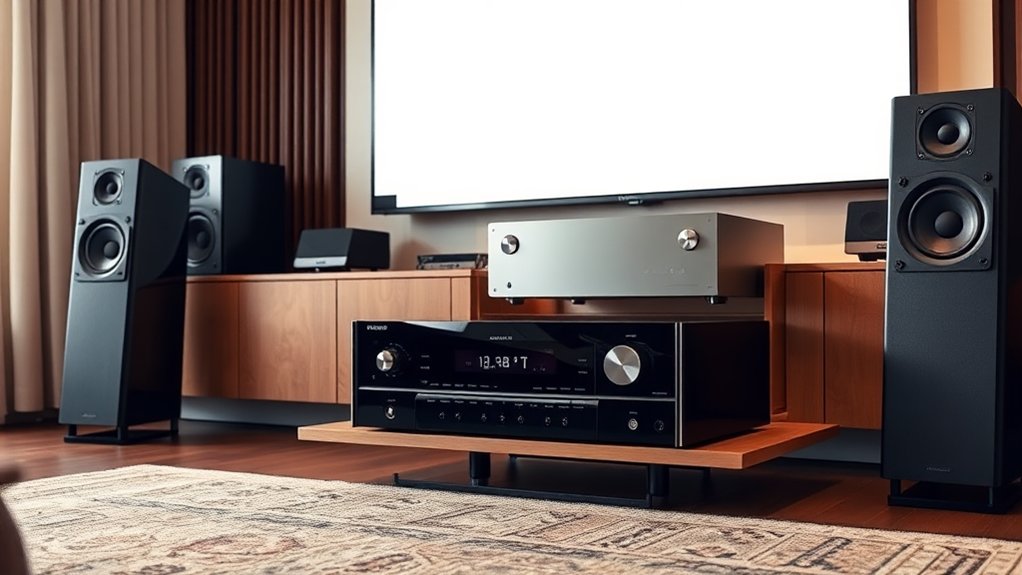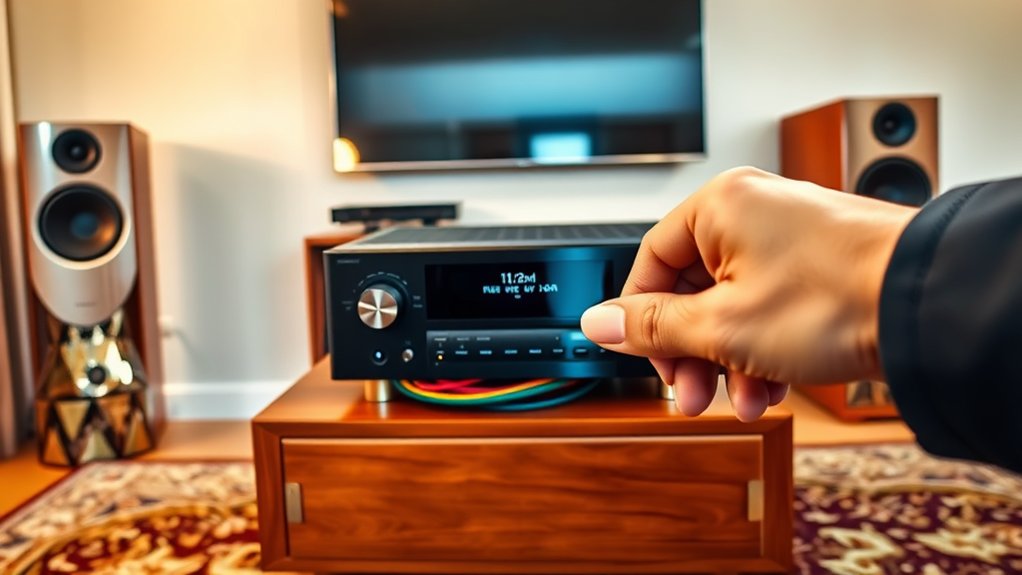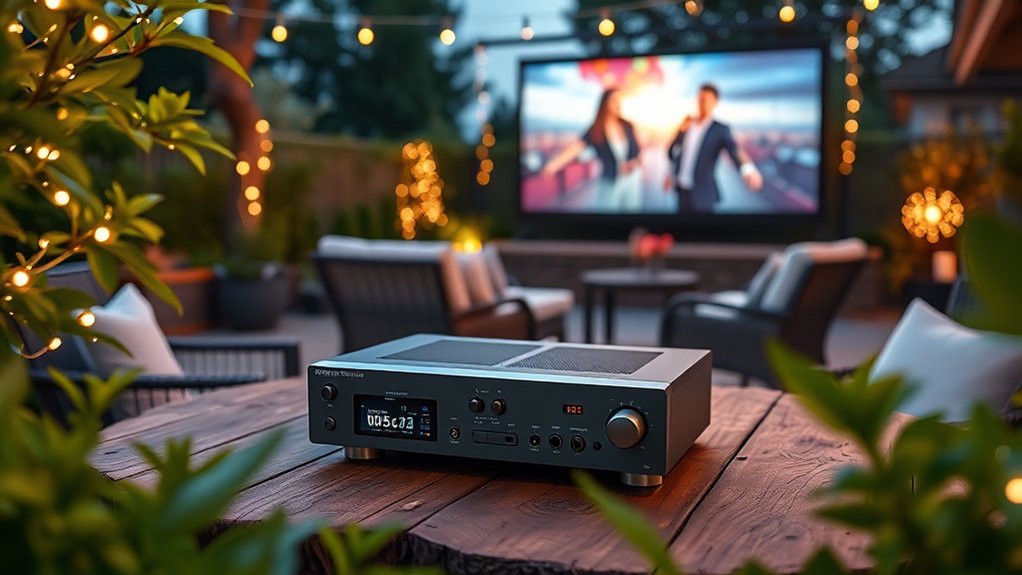When choosing between an AV receiver and an amplifier, think about your needs. If you’re into home theaters or binge-watching shows, an AV receiver might be your best bet, thanks to its multi-channel support and connectivity options. Nevertheless, if you’re a music lover who craves pristine sound quality, a dedicated amplifier will likely give you that crisp audio experience, especially for vinyl. Intrigued? There’s more to investigate about these audio options that could help you make the perfect choice!
Key Highlights
- Consider your primary usage: choose an AV receiver for multi-functional features or a dedicated amplifier for high-fidelity music listening.
- Evaluate audio quality needs: dedicate amplifiers typically offer superior sound clarity compared to AV receivers.
- Check connectivity options: AV receivers provide HDMI support, while amplifiers focus on powering speakers without modern connectivity.
- Assess your budget: AV receivers offer versatile solutions at various price points, while dedicated amplifiers focus on audio performance with potentially higher costs.
- Think about upgrade potential: dedicated amplifiers allow for easier future enhancements in audio setups, while AV receivers integrate more features in one unit.
Understanding the Purpose of AV Receivers and Amplifiers
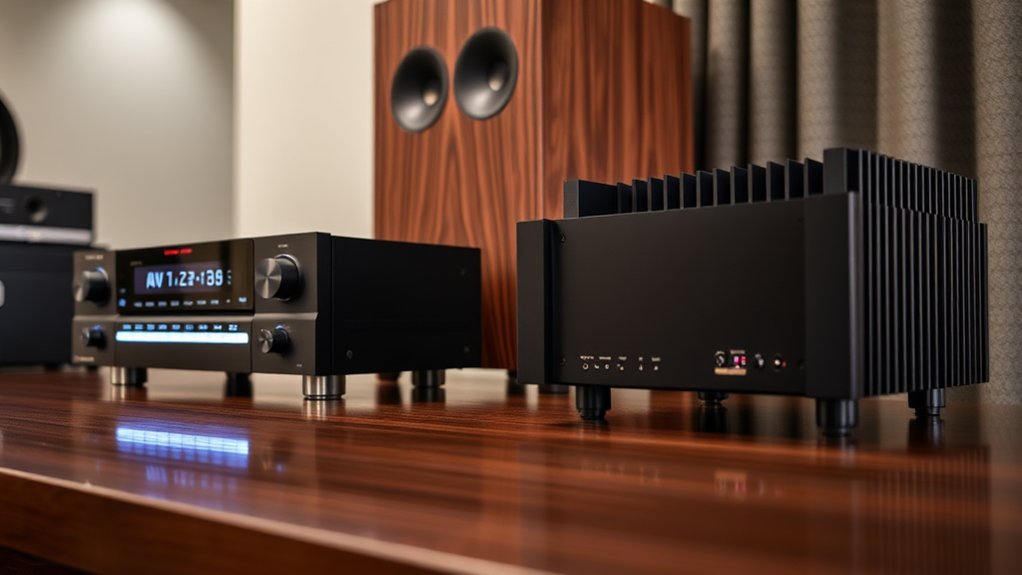
When diving into the world of home audio, understanding the distinction between an AV receiver and an amplifier is essential—it’s like choosing between a Swiss Army knife and a precision screwdriver.
An amplifier’s main job is to boost audio signals, ensuring your speakers deliver high-quality sound. You’ve got types like preamplifiers, which handle volume control, and power amplifiers that pack the punch for your speakers. High-quality components in amplifiers further enhance music reproduction, making them a preferred choice for music enthusiasts. Additionally, amplifiers are essential for speaker operation and sound playback in various setups.
An amplifier boosts audio signals, enhancing sound quality with preamplifiers for volume control and power amplifiers for that extra punch.
Conversely, AV receivers are multi-taskers, combining amplification with video processing and streaming options, making them ideal for home theaters.
If you’re into pure audio quality without the bells and whistles, an amplifier shines.
But if you seek an all-in-one solution, the versatile AV receiver’s got your back—just don’t expect surround sound from a simple amp!
Analyzing Audio Quality and Performance
Audio quality and performance can often seem like a maze, especially when you’re trying to decide between an AV receiver and a dedicated amplifier.
In contrast to AV receivers, which are versatile, packing in features for video and surround sound, they can compromise pure audio quality. Dedicated amplifiers, however, shine in terms of sound clarity and fidelity, focusing purely on amplifying audio. Think of amplifiers as the audiophile’s best friend—providing powerful, clean output that does justice to your favorite music. Certainly, receivers offer convenience with their built-in connectivity options, but do you really need that many features if you’re after pristine sound? Furthermore, stereo amplifiers deliver higher-powered outputs, ensuring clearer sound compared to their AV receiver counterparts. Ultimately, if you’re serious about audio performance, investing in a separate amplifier may be worth the consideration. Additionally, understanding the roles of receivers and amplifiers can greatly enhance your decision-making process. Notably, audio performance is highly regarded in products like the Roku Streambar Pro, which offers impressive sound quality at an affordable price.
Exploring Channel Support for Surround Sound
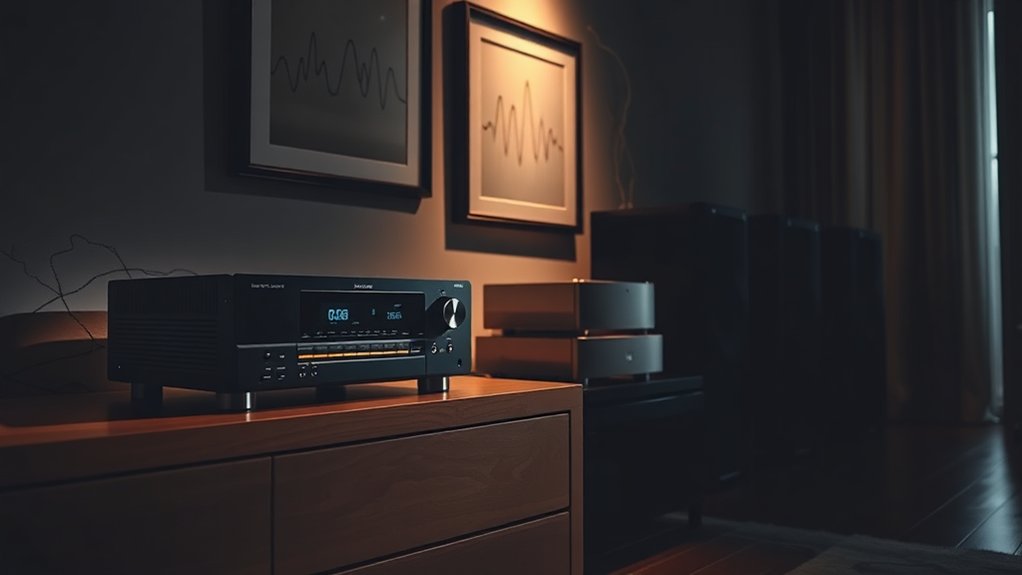
Surround sound setups can seem overwhelming at first glance, especially with all those channel configurations floating around.
You might come across terms like 5.1 or 7.1, which refer to how many speakers and subwoofers are included. Although AV receivers can support complex arrangements—like 11 channels for a full immersive experience—stereo amplifiers typically focus on just two channels. So, if you’re aiming for that cinematic vibe, an AVR is the way to go, as it combines amplification and processing for multiple speakers. Notably, soundbars like the Sony HT-A7000 can also deliver impressive sound quality with 7.1.2 channel support. Yet, if you choose an AVR with fewer channels, you might need external amps to power additional speakers. A 9 channel AVR with external amplification can allow for greater flexibility and better power distribution among your system.
Connectivity Options: What You Need to Know
Choosing the right connectivity options can make or break your home theater experience. If you go with an AV receiver, you’ll enjoy multiple HDMI inputs and outputs, supporting not just 4K video but additionally surround sound formats.
Imagine streaming your favorite series with ideal audio and video through a single cable—pretty convenient, right? Conversely, amplifiers typically focus on powering two speakers, lacking HDMI ports and modern digital streaming capabilities.
Streaming your favorite series with perfect audio and video through a single cable is undeniably convenient, unlike traditional amplifiers that fall short.
So, if you’re planning on connecting a turntable or accessing wireless streaming services like Bluetooth or AirPlay, an AV receiver covers all bases effortlessly.
With advanced input switching to boot, you won’t scramble for remote controls every time you switch sources. Isn’t that a relief?
Cost Comparisons: AV Receivers vs. Amplifiers
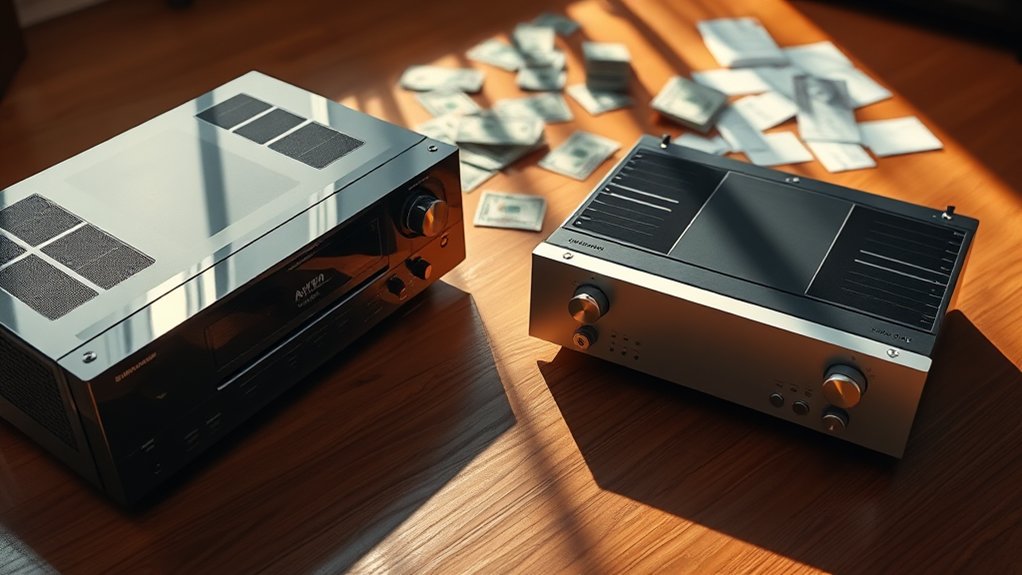
When you’re considering an upgrade to your home audio system, one of the biggest factors that’ll hit your wallet is the cost, and believe it or not, understanding these price tags can save you from buyer’s remorse later.
Entry-level AV receivers start around $300, whereas high-end models can soar to several thousand dollars. In contrast, stereo amplifiers usually range from $200 to over $5,000.
If you want a versatile solution with surround sound and streaming, an AV receiver often offers better value. Nevertheless, if pristine audio quality is your jam, specialized amplifiers might be worth their premium price tag.
In the end, balancing your needs and budget will guarantee you make the right choice without breaking the bank.
Space Considerations for Your Home Setup
Upgrading your audio system isn’t just about costs; it furthermore seriously involves how much space you’ve got to work with. AV receivers tend to hog more room owing to their built-in components, often requiring deep cabinets for proper ventilation.
If your space is tight, consider a compact amplifier that only powers two channels. Certainly, you might need extra gear for surround sound, but it could fit better in smaller areas.
Plus, don’t forget ventilation! Both types generate heat, needing clearance for airflow—nobody wants their system shutting down mid-jam.
Evaluating Features and Functionality
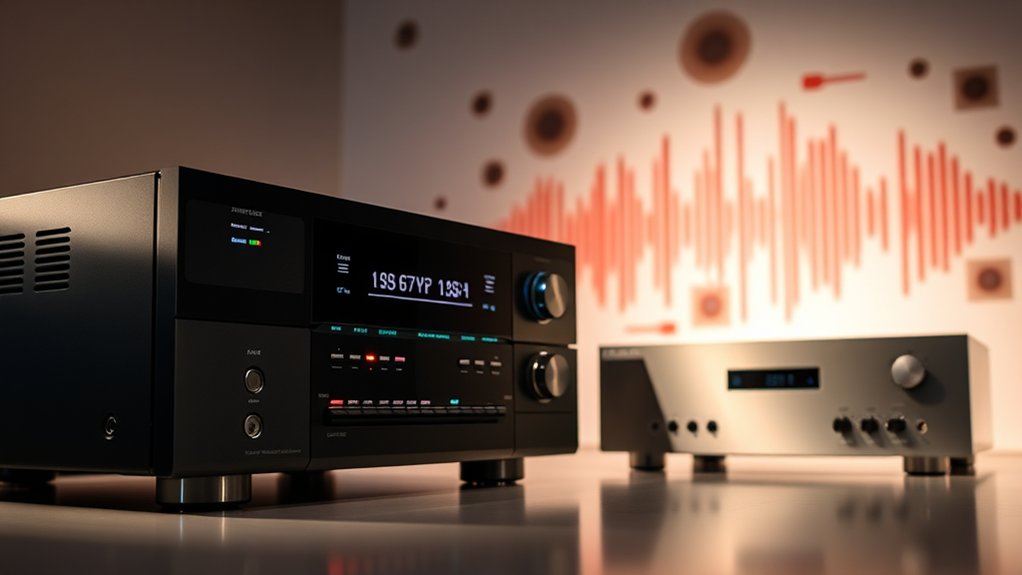
Though you might think that all audio gear serves the same purpose—delivering sound—it’s essential to plunge a little deeper when evaluating features and functionality between AV receivers and amplifiers.
For instance, if you want high-quality audio, dedicated amplifiers excel, offering clarity by amplifying signals directly without extra processing.
On the flip side, AV receivers combine audio and video processing, handling everything from surround sound to video switching, making them perfect for a home theater experience.
You’ll find receivers have an abundance of connection options, including HDMI and Bluetooth, whereas amplifiers stick to simpler analog inputs.
Choosing Based on Usage Scenarios
Choosing the right audio setup often feels like maneuvering through a minefield of options, especially when deciding between an AV receiver and a dedicated amplifier.
If you’re aiming for a fantastic home theater experience, an AV receiver is your best bet. Its multiple channels can create that immersive sound you crave, easily connecting various devices and minimizing clutter.
Nevertheless, if your goal is pure, high-fidelity audio for music listening, a dedicated amplifier shines. It delivers sound with superior clarity, perfect for audiophiles who value crispness over convenience.
For pure, high-fidelity audio, a dedicated amplifier excels, providing audiophiles with unparalleled clarity and detail in their music listening experience.
Think of it this way: if you’re binge-watching a series, go for the receiver; if you’re enjoying a vinyl record, let the amplifier take center stage.
Your choice hinges on how you plan to use your setup!
Balancing Budget With Performance Needs
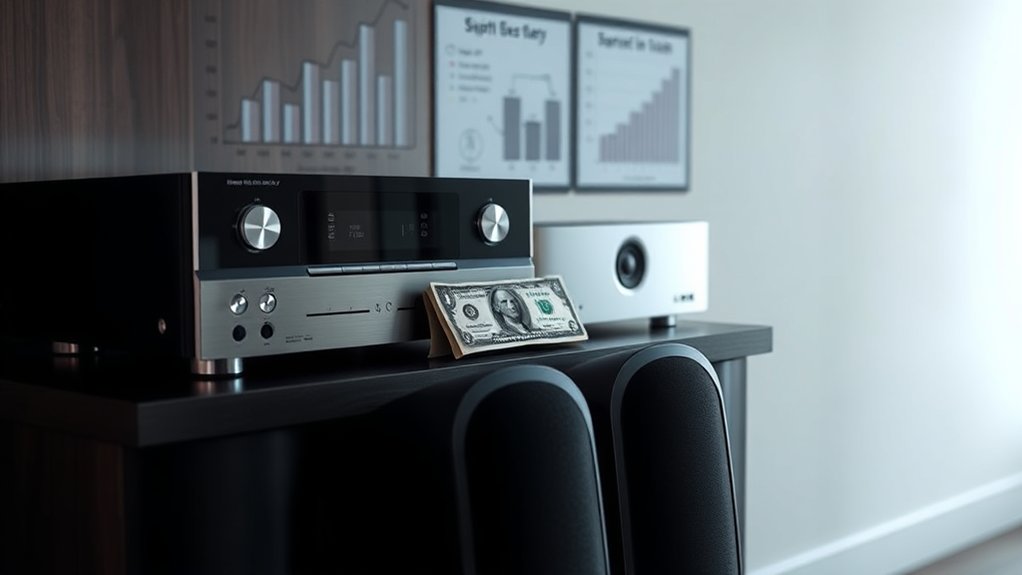
Steering the balance between budget and performance needs can feel like a high-stakes game, especially when you’re torn between an AV receiver and a dedicated amplifier.
If you’re on a tight budget, AV receivers can be appealing since they combine many functions—like audio and video processing—into one unit. You might save money upfront, but don’t forget that dedicated amplifiers often deliver superior sound quality.
Think about it: you could start with an amplifier for rich audio and add components as your budget grows.
It’s all about prioritizing what’s crucial—do you want versatility or the best sound possible? Sometimes, investing in performance, regardless of it meaning forgoing a few features, can lead to a more satisfying experience in the long run.
Frequently Asked Questions
Can AV Receivers Be Upgraded Like Amplifiers?
Unfortunately, you can’t upgrade AV receivers like amplifiers. AV receivers are integrated units that require full replacements for upgrades, whereas amplifiers allow you to swap out specific components to improve sound quality incrementally.
Do AV Receivers Support Vintage Audio Equipment?
Yes, AV receivers can support vintage audio equipment. You’ll need to verify compatibility with impedance and connectivity options, so check your gear’s specifications and consider using adapters to maintain quality sound.
How Long Do AV Receivers and Amplifiers Last?
AV receivers typically last 6 to 12 years before tech becomes outdated, whereas amplifiers can last 10 to 30 years, especially if you maintain them well and control their environment effectively.
Can I Use an Amplifier With an AV Receiver?
Yes, you can use an amplifier with your AV receiver. Just connect the pre-out signals from the receiver to the amplifier and guarantee proper configurations. This setup improves performance and power for your audio system.
Are There Any All-In-One Audio Solutions Besides AV Receivers?
Yes, there are all-in-one audio solutions beyond AV receivers. You can investigate integrated systems like high-performance hi-fi units, whole-house audio setups, or compact streaming speakers that simplify your audio experience as they deliver exceptional sound quality.

